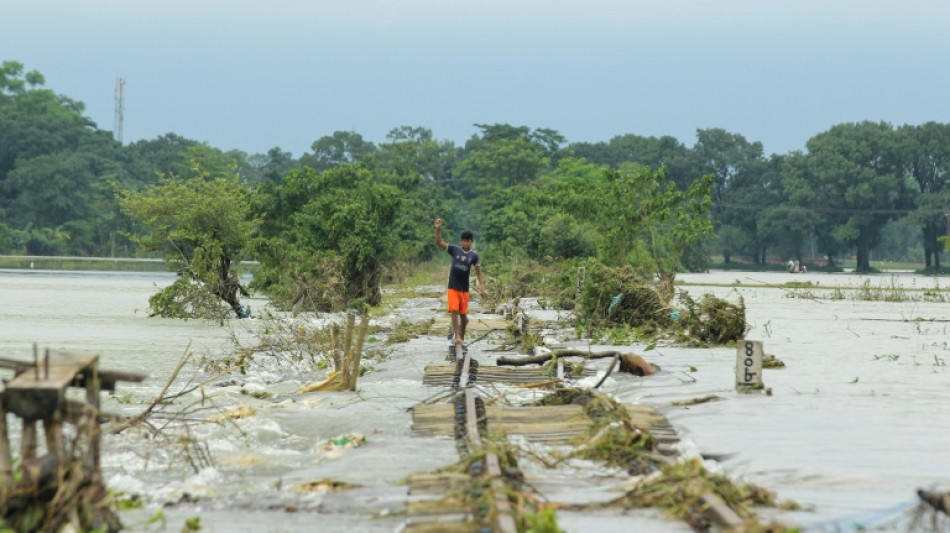
-
 Philippines warns of 'potentially catastrophic' Super Typhoon Man-yi
Philippines warns of 'potentially catastrophic' Super Typhoon Man-yi
-
Wales take on Australia desperate for victory to avoid unwanted record

-
 Tyson beaten by Youtuber Paul in heavyweight return
Tyson beaten by Youtuber Paul in heavyweight return
-
Taylor holds off bloodied Serrano to retain undisputed crown

-
 Japan PM expresses concern to Xi over South China Sea situation
Japan PM expresses concern to Xi over South China Sea situation
-
Tens of thousands flee as Super Typhoon Man-yi nears Philippines

-
 Hoilett gives Canada win in Suriname as Mexico lose to Honduras
Hoilett gives Canada win in Suriname as Mexico lose to Honduras
-
Davis, James spark Lakers over Spurs while Cavs stay perfect

-
 Mushroom houses for Gaza? Arab designers offer home-grown innovations
Mushroom houses for Gaza? Arab designers offer home-grown innovations
-
Gabon votes on new constitution hailed by junta as 'turning point'

-
 Young Libyans gear up for their first ever election
Young Libyans gear up for their first ever election
-
Vice tightens around remaining civilians in eastern Ukraine

-
 Dutch coalition survives political turmoil after minister's resignation
Dutch coalition survives political turmoil after minister's resignation
-
Uruguay end winless run with dramatic late win over Colombia

-
 Max potential: 10 years since a teenage Verstappen wowed in Macau
Max potential: 10 years since a teenage Verstappen wowed in Macau
-
Tens of thousands flee as Typhoon Man-yi nears Philippines

-
 Is Argentina's Milei on brink of leaving Paris climate accord?
Is Argentina's Milei on brink of leaving Paris climate accord?
-
Big Bang: Trump and Musk could redefine US space strategy

-
 Revolution over but more protests than ever in Bangladesh
Revolution over but more protests than ever in Bangladesh
-
Minister resigns but Dutch coalition remains in place

-
 Ireland won 'ugly', says relieved Farrell
Ireland won 'ugly', says relieved Farrell
-
Stirring 'haka' dance disrupts New Zealand's parliament

-
 England's Hull grabs lead over No.1 Korda at LPGA Annika
England's Hull grabs lead over No.1 Korda at LPGA Annika
-
Kosovo players walk off in Romania after 'Serbia' chants, game abandoned

-
 Kosovo players walk off in Romania game after 'Serbia' chants
Kosovo players walk off in Romania game after 'Serbia' chants
-
Lame-duck Biden tries to reassure allies as Trump looms

-
 Nervy Irish edge Argentina in Test nailbiter
Nervy Irish edge Argentina in Test nailbiter
-
Ronaldo at double as Portugal reach Nations League quarters, Spain win

-
 Fitch upgrades Argentina debt rating amid economic pain
Fitch upgrades Argentina debt rating amid economic pain
-
Trump picks Doug Burgum as energy czar in new administration

-
 Phone documentary details struggles of Afghan women under Taliban
Phone documentary details struggles of Afghan women under Taliban
-
Ronaldo shines as Portugal rout Poland to reach Nations League last-eight

-
 Spain beat Denmark to seal Nations League group win
Spain beat Denmark to seal Nations League group win
-
Former AFCON champions Ghana bow out as minnows Comoros qualify

-
 Poland, Britain reach BJK Cup quarter-finals
Poland, Britain reach BJK Cup quarter-finals
-
At summit under Trump shadow, Xi and Biden signal turbulence ahead

-
 Lebanon said studying US truce plan for Israel-Hezbollah war
Lebanon said studying US truce plan for Israel-Hezbollah war
-
Xi warns against 'protectionism' at APEC summit under Trump cloud

-
 Nigerian UN nurse escapes jihadist kidnappers after six years
Nigerian UN nurse escapes jihadist kidnappers after six years
-
India in record six-hitting spree to rout South Africa

-
 George tells England to prepare for rugby 'war' against Springboks
George tells England to prepare for rugby 'war' against Springboks
-
Pogba's Juve contract terminated despite doping ban reduction

-
 Ukraine slams Scholz after first call with Putin in two years
Ukraine slams Scholz after first call with Putin in two years
-
Michael Johnson's Grand Slam Track series to have LA final

-
 Kagiyama, Yoshida put Japan on top at Finland Grand Prix
Kagiyama, Yoshida put Japan on top at Finland Grand Prix
-
Alcaraz eyeing triumphant Davis Cup farewell for Nadal after ATP Finals exit

-
 Xi, Biden at Asia-Pacific summit under Trump trade war cloud
Xi, Biden at Asia-Pacific summit under Trump trade war cloud
-
India go on record six-hitting spree against South Africa

-
 France skipper Dupont says All Blacks 'back to their best'
France skipper Dupont says All Blacks 'back to their best'
-
Trump pressures US Senate with divisive cabinet picks


The Anthropocene heralds disaster. Can humans change course?
Her distant ancestors paddled canoes across the Pacific Ocean to settle what became the island nation of Tuvalu, but now climate change means Grace Malie and her generation may live to see those islands swallowed by the sea.
Pacific island nations are ground zero for climate change impacts and their plight embodies the sweeping environmental damage that is the hallmark of the era of humans, the Anthropocene.
Confronted with a warming world that could engulf her home forever, Malie said it would be easy to think she and her people have "no future".
But the 24-year-old climate campaigner said young people are determined to chart their own destiny -- even if they cannot stop planet-heating emissions on their own.
"I remain hopeful," she told AFP in an interview. "My generation is really taking matters into their own hands."
Malie has worked to share the story of her community as part of her role with the Rising Nations Initiative, a global partnership launched by Pacific atoll nations to preserve their sovereignty and heritage.
"There may be solutions out there, things that we've never thought of, innovative ideas," she said.
The fossil fuels that powered the industrial revolution and prosperity have already warmed the planet 1.2 degrees Celsius, unleashing extreme weather and human upheaval.
Last week saw records for the hottest day on Earth, on three successive days.
Oceans, soils and forests have been dangerously degraded, and key life-support systems across the planet are at risk.
Humans have pushed their only home well into the danger zone. Can we change our ways and build a sustainable life on Earth?
Many experts say that is still -- if only just -- within our grasp, and that we should dare to imagine thriving, rather than simply surviving in a blighted world.
- Collapse -
Last year's UN Human Development Report warned that people across the world were facing a perfect storm of uncertainties, linked to the "destabilising planetary pressures and inequalities of the Anthropocene", societal transformations and political polarisation.
Pedro Conceicao, who led the report, said he worries that fears of "collapse" are clouding humanity's ability to envisage a way to flourish.
That echoes concerns from climate scientists that people's sense of "doom" is blocking progress.
Erle Ellis, a professor at the University of Maryland, Baltimore County, concedes that the "best time for it to be a hundred percent carbon neutral is yesterday".
Yet humanity is not trapped in a cycle of destruction, he said.
"We're capable of harnessing unbelievable amounts of energy to do things at scale, we can fly, we can leave the planet," he said.
"Things are changing really fast now, so there are a lot of possible futures that would never have existed in the past, that are realistic now."
But are people imagining these futures? Or how to avoid catastrophe?
"As a writer, as a creator, it is terrifyingly easy to build dystopias," novelist Manda Scott told AFP.
She thinks the answer is "thrutopias" that tell the stories of change, and has run workshops to share these ideas with other writers.
"Our imaginings of the future are very locked within the current system," said Scott, who has also written a new thrutopian novel.
"It's easier to imagine the total extinction of life on Earth than an end to predatory capitalism, because we think this is the way it is."
She describes imagining the transformation human societies and nature might go through in order to thrive as akin to guessing what form a caterpillar might take in adulthood.
"If you didn't know that process, I pretty much guarantee that there is no way you would predict butterfly from caterpillar," she said.
- Charting a path -
Few places have to confront the possibility of radical change more directly than Pacific island nations, with some facing becoming uninhabitable even if the world meets the Paris accord goal of eventually limiting warming to 1.5C.
Tuvalu, Kiribati and the Marshall Islands are calling for a global settlement guaranteeing their states a "permanent existence" even as the seas rise.
It is real stories that inspire Grace Malie, who is working with others to record oral histories for an online cultural archive, part of a push for UNESCO protection for Tuvalu's heritage.
Her grandfather, descended from chiefs, was among those interviewed.
As custodian of the family tree, the 75-year-old can trace heritage going back generations.
"Pacific people come from a long line of voyagers, of warriors and they carry that passion, that resilience," said Malie, who said she was "humbled" to think of the great ocean voyages of her ancestors.
"Kudos to their resilience and hard work and their bravery. That's passed on to us now, and we hope to make them proud."
B.Shevchenko--BTB
